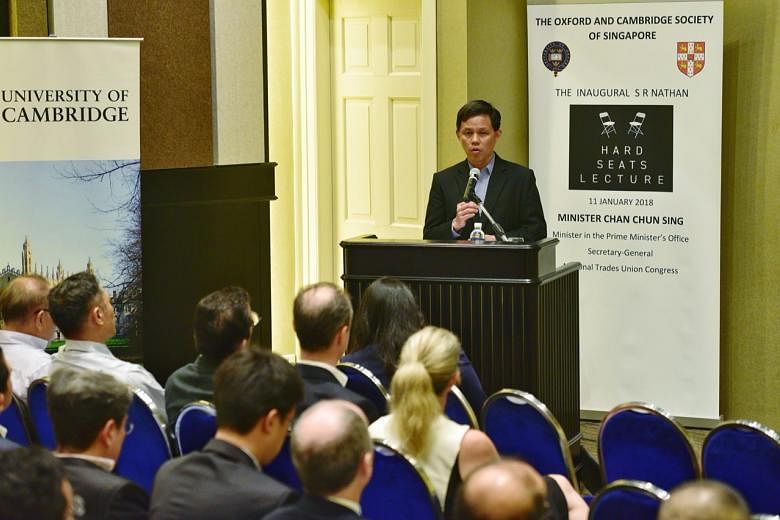SINGAPORE - To earn the trust of the people, each generation of Singapore's leaders needs to be upfront, accountable and find new ways to communicate with people, Minister in the Prime Minister's Office Chan Chun Sing said on Thursday (Jan 11).
In a wide-ranging lecture, which also touched on issues like geopolitics and social mobility, Mr Chan - tipped as one of the three ministers who are in the running to be Singapore's fourth prime minister - laid out his vision of how each succeeding generation of leaders should carry out their duties.
Gaining the trust and confidence of the people is key, said Mr Chan, an economics graduate of Cambridge University who was speaking at the inaugural S R Nathan Hard Seats Lecture organised by the Oxford and Cambridge Society of Singapore at the Pyramid Club in Newton.
He pointed out that the late Mr Lee Kuan Yew had called it his team's "greatest asset". Having this trust enables effective leaders who do not shirk away from making difficult but necessary decisions, such as introducing mandatory National Service when Singapore needed a credible defence force, or requiring land acquisitions so that land can be redeveloped and used more efficiently.
To win this trust, leaders have to first be upfront with people, and help Singaporeans understand the issues at stake and the trade-offs involved in policy considerations - spending more time on the "why" rather than the "what" and "how", said Mr Chan.
Second, in a fast-paced digital age where a diversity of views can be accessed at one's fingertips, leaders must keep finding new ways to communicate with different generations. "If we do this well, we will harness the collective power of our thinking and actions."
Third, leaders must be accountable and responsible. "That means making good on our promises," said Mr Chan. "And when there are problems, we work hard to put things right immediately."
Some policies may take longer to bring about results, and these must be made clear from the start so that Singaporeans know what to expect, he added.
Being consultative and nimble in meeting the needs of Singaporeans, while maintaining finite resources responsibly, are instrumental in ensuring that Singapore does not "face a trust deficit, and run the risk of citizens disconnecting with or disenfranchised by the Government".
"We have seen this happen in other countries, and we can't take for granted that it won't happen in Singapore," said Mr Chan.
Younger Singaporeans may not face the existential "life and death" struggles that had brought the country's pioneers together in their common goal to see Singapore succeed in the early years of independence. Yet, this generation must "similarly understand that we too have our share of 'life and death' struggles to keep this country going," said Mr Chan.
For instance, Singaporeans face the common challenge of economic restructuring and global disruption, and businesses, workers and the Government will need to adapt to a new model of doing things.
In the midst of this change, there is a need to guard against a widening gap between the "winners" of the new economy, and those who are lagging behind, said Mr Chan.
There are also new faultlines that may emerge, such as cleavages between new citizens and those who have migrated here much earlier. "We need to have a broad middle ground that enables us to stay cohesive."
The focus on social mobility is thus key to Singapore's social compact, he added, and has helped retain and attract talent. But targeted policies are also needed to ensure equity in Singapore's systems, said Mr Chan, as "the realities of the world and the frailties of human nature, (when) left to themselves, will likely lead to a stratified and ossified society."
Singaporeans also have to maintain a keen sense of the wider and deeper geographical forces that impact them. While the contest for influence among global powers will grow, Singapore must remain principled and "not waver for short-term gains". Time and effort should be invested into helping Singaporeans understand such dynamics, so that "we will be able to stand united in the face of overt pressures and covert influences".
"Ultimately, people and government must work together to keep Singapore successful," said Mr Chan.
"So long as we have this trust, and stay united in facing the challenges, there's no reason for us to not be able to succeed as a country."


